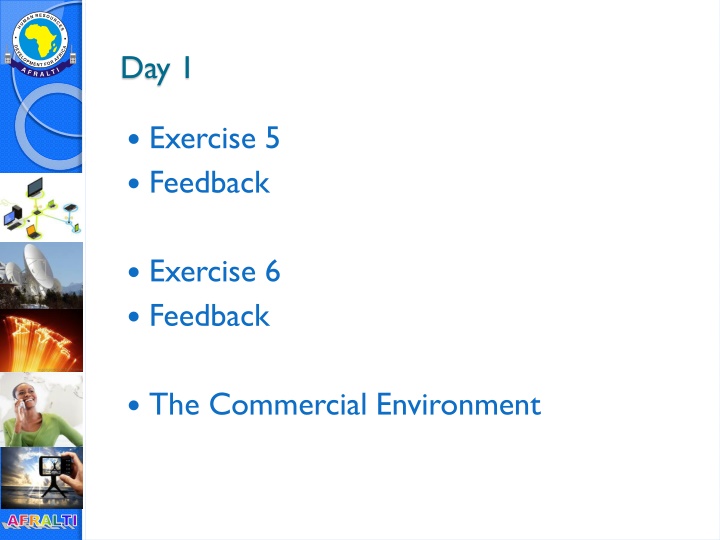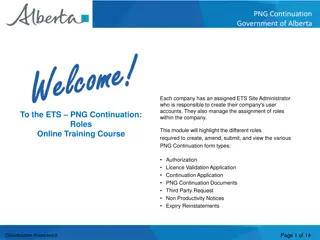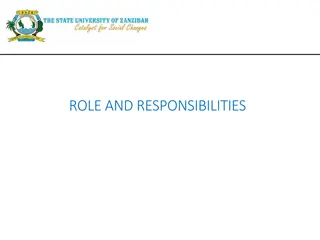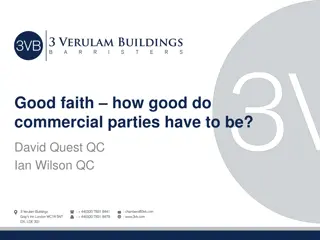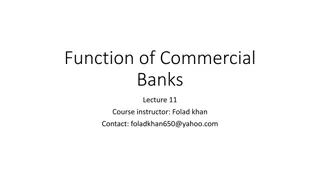Roles and Responsibilities in the Commercial Environment
A commercial environment involves establishing a company with shareholders and a responsible board of directors. Key roles include Chairman, CEO, CFO, COO, and Executive/Non-Executive Directors. Each position plays a vital role in ensuring the company's smooth operation, financial stability, and strategic direction.
Uploaded on Sep 29, 2024 | 1 Views
Download Presentation

Please find below an Image/Link to download the presentation.
The content on the website is provided AS IS for your information and personal use only. It may not be sold, licensed, or shared on other websites without obtaining consent from the author.If you encounter any issues during the download, it is possible that the publisher has removed the file from their server.
You are allowed to download the files provided on this website for personal or commercial use, subject to the condition that they are used lawfully. All files are the property of their respective owners.
The content on the website is provided AS IS for your information and personal use only. It may not be sold, licensed, or shared on other websites without obtaining consent from the author.
E N D
Presentation Transcript
Day 1 Exercise 5 Feedback Exercise 6 Feedback The Commercial Environment AFRALTI
The Commercial Environment Establishment of a Company with Shareholders A Legally responsible Board of Directors The Role of Companies House Annual Accounts AFRALTI
A commercial environment is one in which a company is established with a number of shareholders and a legally responsible board of directors. In the United Kingdom all companies operating under a board of directors, have to register the company at Companies House along with each director serving on the board. Furthermore a complete set of accounts must be filed annually for external scrutiny. AFRALTI
A company normally has either an Executive or Non-Executive Chairman, a Chief Executive Officer (CEO), a Chief Financial Officer (CFO), a Chief Operating Officer (COO) and a number of Non-Executive Directors in the case of large publicly listed companies. AFRALTI
Roles & Responsibilities Chairman (often Non-Executive) Chief Executive Officer Chief Financial Officer Chief Operating Officer Other Executive Directors Other Non-Executive Directors AFRALTI
Chairman (often Non-Executive) The Chairman (or President) is the highest level official who is responsible for ensuring the smooth running of board meetings and a first point of contact for the CEO. Chief Executive Officer The term executive implies an employee who works on a full time basis for the company and is deemed overall responsible for the strategy and day-to-day running of the organisation. AFRALTI
Chief Financial Officer The CFO is responsible for maintaining accurate and up to date accounts reflecting the financial performance of the company. It is not just a matter of ensuring bills on time but that invoices are sent out on time and dues collected on time. Moreover it is critical that where surplus cash exists that such monies are properly invested. Chief Operating Officer The COO is responsible for the day to day running of the Operating Company operations and often acts as a bridge between the CEO and CFO since the role normally infers a closeness to the operational issues. In the case of a Communications Organisation this is a key and demanding role. AFRALTI
Other Executive Directors Some companies employ Human Resource, Manufacturing, Information Technology, Marketing, Project and other Director Positions dependant upon the nature of the business. Non Executive Directors In addition to executive positions, most large companies employ the services of a number of distinguished personnel to scrutinise the performance of the organisation in the interest of the company s shareholders. AFRALTI
The company will hold regular board meetings when executive members will be expected to report to the whole board how the company is performing and to ensure the directors are all aware of potential areas for concern, such as failing to meet financial expectations which had previously been forecasted. AFRALTI
The Role of Share holders Who are they? What is there role? Institutional Investor Individual Investor AFRALTI
Share holders Anyone holding shares in a company which may be purchased through a dealer is entitled to vote at General Meetings and receive a dividend reflecting the performance of the company over the previous 6 months or in some cases 12 months of trading. A publicly listed company on the stock market is known as a plc whereas a small company will be registered at Companies House but with limited liability is referred to as Ltd. AFRALTI
The Commercial Organisation Annual General Meeting (AGM) Extraordinary General Meeting (EGM) Board Meetings Dividend Various Stock Exchanges AFRALTI
Stock Exchanges London Wall Street (New York) Tokyo AFRALTI
Typical Actions when Commercialising Identify Core Business Down Size Out-Source Forecasting Business Planning AFRALTI
